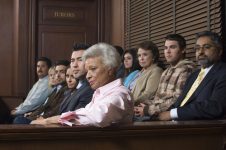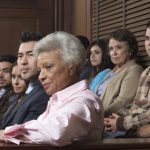What Disqualifies or Exempts a Person from Serving as a Juror in NSW?

The rules relating to jury service in New South Wales are primarily regulated by the Jury Act 1977.
Section 5 provides that every person who is enrolled as an elector for the Legislative Assembly of New South Wales is qualified and liable to serve as a juror.
However, the provision is subject to section 6 which states that persons listed in Schedule 1 of the Act are disqualified from serving as jurors.
Disqualified persons
Schedule 1 sets out the following rules. A person is excused from jury duty:
- For life if found guilty of an offence punishable by life imprisonment, a terrorism offence, a public justices offence under Part 7 of the Crimes Act 1900 such as perverting the course of justice or a sexual offence within the meaning of section 7(4) of the Criminal Records Act 1991.
- While serving a sentence of imprisonment anywhere in Australia for an offence committed when he or she was over the age of 18 years.
- For 7 years after serving a sentence/s of imprisonment of less than 3 consecutive months, or for 10 years after serving a consecutive sentence/s 3 months or more. A sentence of imprisonment includes periodic detention, home detention, compulsory drug treatment detention, a suspended sentence, probation or parole, or an equivalent order anywhere in Australia.
- During any period where he or she is detained in a detention centre, correctional centre or institution for juvenile offenders while under the age of 18 years.
- For 3 years after a person under the age of 18 years was detained in a detention centre, correctional centre or institution for juvenile offenders.
- During any period in which he or she is subject to an apprehended violence order, community service order, extended supervision order, continuing detention order, interim detention order, emergency detention order, non-association order, place restriction order, prohibition order, contact prohibition order, an order to attend a drug program under section 7A of the Drug Court Act or an intervention program.
- During any period in which he or she is in custody, awaiting trial, sentence, or determination of an appeal, subject to a preventative detention order, control order or interim control order, is a registrable child offender, is bound by an undertaking to participate in a program under the Pre-trial Diversion of Offenders Act, is subject to a limiting term under Mental Health (Forensic Provisions) Act, is detained in a hospital under the provisions of the Crimes Act 1914.
- While holding the office of Governor, judicial officer, member of the Executive Council, Legislative Council or Legislative Assembly, Ombudsman, Deputy Ombudsman or Assisting Ombudsman, or has held one of those offices within the past 3 years.
- While an Australian Lawyer.
- While he or she is a paralegal employed or engaged in the public sector in the provision of legal services in criminal cases.
- While he or she is employed or engaged as a member of staff in the Office of the Ombudsman, Office of the DPP or Crown Solicitor’s Office.
- While he or she is engaged or employed in law enforcement or criminal investigation in the NSW Police Force, Australian Federal Police, NSW Crime Commission, Australian Crime Commission, Law Enforcement Conduct Commission or Independent Commission Against Corruption, or has held one of those positions within the past 3 years.
- While he or she has direct access to inmate information as a member, officer or employee of the Department of the Attorney General and Justice, State Parole Authority, Serious Offenders Review Council, Serious Young Offenders Review Panel, Serious Young Offenders Review Panel, Probation and Parole Service, Justice and Forensic Mental Health Network or Mental Health Review Panel, or had held one of those positions within the past 3 years.
- While he or she is an undischarged bankrupt.
Exclusion do not apply if they relate to a finding of guilt which was later quashed, annulled or was the subject of a pardon.
Persons entitled to an exemption
In addition to the exclusions, section 7 of the Act provides that certain categories of people are entitled to an exemption from jury duty.
Those classes of people are listed in Schedule 2 of the Act. They comprise:
- Clergy
- Vowed members of any religious order
- Persons practising as dentists, pharmacists and medical practitioners
- Persons employed or engaged (except on a casual or voluntary basis) in fire, ambulance, rescue or other emergency services, whether private or public
- Persons who served as jurors within the previous 3 years
- Persons who attended court pursuant to a summons to act as a juror within the past 12 months but did not serve
- Persons entitled to an exemption under section 39 due to previous lengthy jury service
- Persons who reside with and have full time care of a person who is sick, infirm or disabled
Determined by sheriff
Section 14 states that claims for excluded and exemption are to be made to, and determined by, the sheriff of the court.
Exemptions where there is “good cause” to do so
In addition to the outlined exclusions and exemptions, the sheriff may exempt a person if there is “good cause” to do so which, under section 14A, is where:
(a) jury service would cause undue hardship or serious inconvenience to the person, the person’s family or the public, or
(b) some disability associated with that person would render him or her, without reasonable accommodation, unsuitable for or incapable of effectively serving as a juror, or
(c) a conflict of interest or some other knowledge, acquaintance or friendship exists that may result in the perception of a lack of impartiality in the juror, or
(d) there is some other reason that would affect the person’s ability to perform the functions of a juror.
Enquiries regarding jury duty can be made to the court registry, the general number for which in NSW is 1300 679 272.






